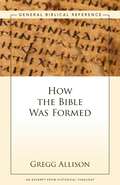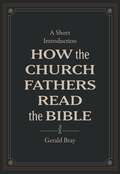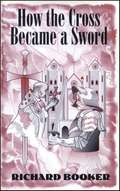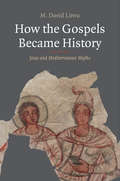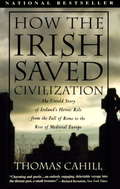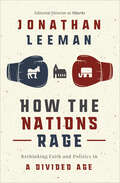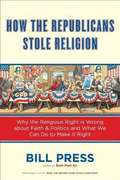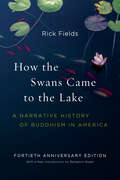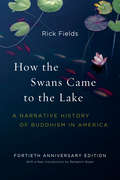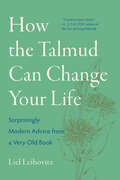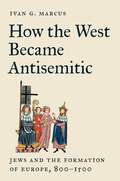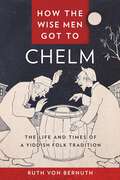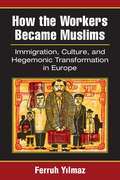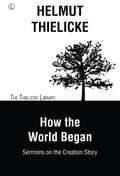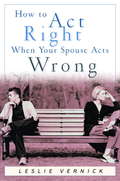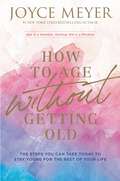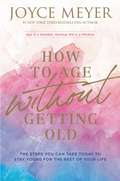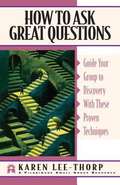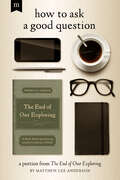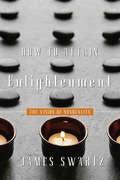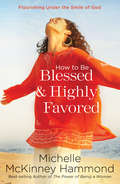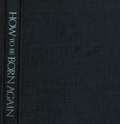- Table View
- List View
How the Bible Was Formed: A Zondervan Digital Short
by Gregg AllisonDerived from Gregg Allison’s magisterial Historical Theology, this digital short provides a concise but thorough history of how both New Testament and Old Testament books were identified as Scripture and incorporated into the final canon. Attention is paid to differences between the Catholic and Protestant canons and to debates about the inclusion of apocryphal books. The equivalent of a series of lectures on Scripture’s formation, with extensive footnoting for further reading, this digital short provides a one-stop reference resource on a foundational matter of Christian doctrine and worship.
How the Church Fathers Read the Bible: A Short Introduction
by Gerald BrayRead the Scriptures with the insight of our forebears Christians live in the house built by the church fathers. Essential Christian doctrines were shaped by how figures such as Justin Martyr, Irenaeus, and Augustine read the Bible. But appreciating patristic interpretation is not just for the historically curious, as if it were only a matter of literary archaeology. Nor should it be intimidating. Rather, the fathers gleaned insights from Scripture that continue to be relevant to all Christians. How the Church Fathers Read the Bible is an accessible introduction to help you read Scripture with the early church. With a clear and simple style, Gerald Bray explains the distinctives of early Christian interpretation and shows how the fathers interpreted key Bible passages from Genesis to Revelation. Their unique perspective is summed up in seven principles that can inspire our Bible reading today. With Bray as your guide, you can reclaim the rich insights of the fathers with reverence and discernment.
How the Cross Became a Sword
by Richard BookerThis publication explains the events that separated Christianity from its Jewish roots and established anti-Semitism as official church doctrine.
How the Gospels Became History: Jesus and Mediterranean Myths (Synkrisis)
by M. David LitwaA compelling comparison of the gospels and Greco-Roman mythology which shows that the gospels were not perceived as myths, but as historical records Did the early Christians believe their myths? Like most ancient—and modern—people, early Christians made efforts to present their myths in the most believable ways. In this eye-opening work, M. David Litwa explores how and why what later became the four canonical gospels take on a historical cast that remains vitally important for many Christians today. Offering an in-depth comparison with other Greco-Roman stories that have been shaped to seem like history, Litwa shows how the evangelists responded to the pressures of Greco-Roman literary culture by using well-known historiographical tropes such as the mention of famous rulers and kings, geographical notices, the introduction of eyewitnesses, vivid presentation, alternative reports, and so on. In this way, the evangelists deliberately shaped myths about Jesus into historical discourse to maximize their believability for ancient audiences.
How the Heart Runs (Mystery and the Minister’s Wife Series, Book 18)
by Anne Marie RodgersThe woman, clearly shaken, pleads for Kate to stay by her side even as paramedics come to her aid, and they quickly forge a friendship. Despite Kate's growing affection for Emmaline, the woman seems evasive about the details of her sickness--and her past--and Kate begins to question what exactly has afflicted Emmaline. How can Kate properly minister to her if she doesn't know the whole truth? Who is this private, lonely woman? Meanwhile, a young mother in town is slowly recovering from major surgery and her family struggles to cope. As Kate cares for the family while also meeting the demands of her friendship with Emmaline, she begins to see there's much more to the mysterious woman than she ever imagined.
How the Irish Saved Civilization (The Hinges of History)
by Thomas CahillNATIONAL BESTSELLER • A book in the best tradition of popular history—the untold story of Ireland's role in maintaining Western culture while the Dark Ages settled on Europe. • The perfect St. Patrick's Day gift!Every year millions of Americans celebrate St. Patrick's Day, but they may not be aware of how great an influence St. Patrick was on the subsequent history of civilization. Not only did he bring Christianity to Ireland, he instilled a sense of literacy and learning that would create the conditions that allowed Ireland to become "the isle of saints and scholars"—and thus preserve Western culture while Europe was being overrun by barbarians. In this entertaining and compelling narrative, Thomas Cahill tells the story of how Europe evolved from the classical age of Rome to the medieval era. Without Ireland, the transition could not have taken place. Not only did Irish monks and scribes maintain the very record of Western civilization -- copying manuscripts of Greek and Latin writers, both pagan and Christian, while libraries and learning on the continent were forever lost—they brought their uniquely Irish world-view to the task. As Cahill delightfully illustrates, so much of the liveliness we associate with medieval culture has its roots in Ireland. When the seeds of culture were replanted on the European continent, it was from Ireland that they were germinated. In the tradition of Barbara Tuchman's A Distant Mirror, How The Irish Saved Civilization reconstructs an era that few know about but which is central to understanding our past and our cultural heritage. But it conveys its knowledge with a winking wit that aptly captures the sensibility of the unsung Irish who relaunched civilization.
How the Nations Rage: Rethinking Faith and Politics in a Divided Age
by Jonathan LeemanHow can the church move forward in unity amid such political strife and cultural contention?As Christians, we&’ve felt pushed to the outskirts of national public life, yet even within our congregations we are divided about how to respond. Some want to strengthen the evangelical voting bloc. Others focus on social justice causes, and still others would abandon the public square altogether. What do we do when brothers and sisters in Christ sit next to each other in the pews but feel divided and angry? Is there a way forward?In How the Nations Rage, political theology scholar and pastor Jonathan Leeman challenges Christians from across the spectrum to hit the restart button byshifting our focus from redeeming the nation to living as a nation already redeemedrejecting the false allure of building heaven on earth while living faithfully as citizens of a heavenly kingdomletting Jesus&’ teaching shape our public engagement as we love our neighbors and seek justiceWhen we identify with Christ more than a political party or social grouping, we can return to the church&’s unchanging political task: to become the salt and light Jesus calls us to be and offer the hope of his kingdom to the nations.
How the Republicans Stole Religion: Why the Religious Right is Wrong about Faith & Politics and What We Can Do to Make it Right
by Bill PressFor decades, Press argues, conservatives have defined religion so narrowly that Democrats and liberals have been pushed outside the fold. According to their narrow gospel, God put George W. Bush in the White House to deal with gays, guns, and abortion—and those who don’t agree are on the sure road to hell. How the Republicans Stole Religion is Press’s fervent call for the left to reclaim religion and return it to its basic principles of social justice, charity, and tolerance.
How the Swans Came to the Lake: A Narrative History of Buddhism in America
by Rick Fields Benjamin BoginThis new updated edition of How the Swans Came to the Lake includes much new information about recent events in Buddhist groups in America and discusses such issues as spiritual authority, the role of women, and social action.
How the Swans Came to the Lake: A Narrative History of Buddhism in America
by Rick FieldsThis new updated edition of How the Swans Came to the Lake includes much new information about recent events in Buddhist groups in America and discusses such issues as spiritual authority, the role of women, and social action.
How the Talmud Can Change Your Life: Surprisingly Modern Advice from a Very Old Book
by Liel Leibovitz“I could not put it down.”—A. J. Jacobs, author of The Year of Living Biblically A witty and wide-ranging exploration of a book that has perplexed and delighted people for centuries: the Talmud. For numerous centuries, the Talmud—an extraordinary work of Jewish ethics, law, and tradition—has compelled readers to grapple with how to live a good life. Full of folk legends, bawdy tales, and rabbinical repartee, it is inspiring, demanding, confounding, and thousands of pages long. As Liel Leibovitz enthusiastically explores the Talmud, what has sometimes been misunderstood as a dusty and arcane volume becomes humanity’s first self-help book. How the Talmud Can Change Your Life contains sage advice on an unparalleled scope of topics, which includes communicating with your partner, dealing with grief, and being a friend. Leibovitz guides readers through the sprawling text with all its humor, rich insights, compulsively readable stories, and multilayered conversations. Contemporary discussions framed by Talmudic philosophy and psychology draw on subjects ranging from Weight Watchers and the Dewey decimal system to the lives of Billie Holiday and C. S. Lewis. Chapters focus on fundamental human experiences—the mind-body problem, the power of community, the challenges of love—to illuminate how the Talmud speaks to our daily existence. As Leibovitz explores some of life’s greatest questions, he also delivers a concise history of the Talmud itself, explaining the process of its lengthy compilation and organization. With infectious passion and candor, Leibovitz brilliantly displays how the Talmud’s wisdom reverberates for the modern age and how it can, indeed, change your life.
How the West Became Antisemitic: Jews and the Formation of Europe, 800–1500
by Ivan G. MarcusAn examination of how the Jews—real and imagined—so challenged the Christian majority in medieval Europe that it became a society that was religiously and culturally antisemitic in new ways In medieval Europe, Jews were not passive victims of the Christian community, as is often assumed, but rather were startlingly assertive, forming a Jewish civilization within Latin Christian society. Both Jews and Christians considered themselves to be God&’s chosen people. These dueling claims fueled the rise of both cultures as they became rivals for supremacy. In How the West Became Antisemitic, Ivan Marcus shows how Christian and Jewish competition in medieval Europe laid the foundation for modern antisemitism.Marcus explains that Jews accepted Christians as misguided practitioners of their ancestral customs, but regarded Christianity as idolatry. Christians, on the other hand, looked at Jews themselves—not Judaism—as despised. They directed their hatred at a real and imagined Jew: theoretically subordinate, but sometimes assertive, an implacable &“enemy within.&” In their view, Jews were permanently and physically Jewish—impossible to convert to Christianity. Thus Christians came to hate Jews first for religious reasons, and eventually for racial ones. Even when Jews no longer lived among them, medieval Christians could not forget their former neighbors. Modern antisemitism, based on the imagined Jew as powerful and world dominating, is a transformation of this medieval hatred.A sweeping and well-documented history of the rivalry between Jewish and Christian civilizations during the making of Europe, How the West Became Antisemitic is an ambitious new interpretation of the medieval world and its impact on modernity.
How the Wise Men Got to Chelm: The Life and Times of a Yiddish Folk Tradition (Families, Law, and Society)
by Ruth von BernuthHow the Wise Men Got to Chelm is the first in-depth study of Chelm literature and its relationship to its literary precursors. When God created the world, so it is said, he sent out an angel with a bag of foolish souls with instructions to distribute them equally all over the world—one fool per town. But the angel’s bag broke and all the souls spilled out onto the same spot. They built a settlement where they landed: the town is known as Chelm. The collected tales of these fools, or “wise men,” of Chelm constitute the best-known folktale tradition of the Jews of eastern Europe. This tradition includes a sprawling repertoire of stories about the alleged intellectual limitations of the members of this old and important Jewish community. Chelm did not make its debut in the role of the foolish shtetl par excellence until late in the nineteenth century. Since then, however, the town has led a double life—as a real city in eastern Poland and as an imaginary place onto which questions of Jewish identity, community, and history have been projected. By placing literary Chelm and its “foolish” antecedents in a broader historical context, it shows how they have functioned for over three hundred years as models of society, somewhere between utopia and dystopia. These imaginary foolish towns have enabled writers both to entertain and highlight a variety of societal problems, a function that literary Chelm continues to fulfill in Jewish literature to this day.
How the Workers Became Muslims: Immigration, Culture, and Hegemonic Transformation in Europe
by Ferruh YilmazWriting in the beginning of the 1980s, Ernesto Laclau and Chantal Mouffe explored possibilities for a new socialist strategy to capitalize on the period's fragmented political and social conditions. Two and a half decades later, Ferruh Yilmaz acknowledges that the populist Far Right-not the socialist movement-has demonstrated greater facility in adopting successful hegemonic strategies along new structural lines Laclau and Mouffe imagined. Right-wing hegemonic strategy, Yilmaz argues, has led to the reconfiguration of internal fault lines in European societies. Yilmaz's primary case study is Danish immigration discourse, but his argument contextualizes his study in terms of questions of current concern across Europe, where right-wing groups that were long on the fringes of "legitimate" politics have managed to make significant gains with populations traditionally aligned with the Left. Specifically, Yilmaz argues that sociopolitical space has been transformed in the last three decades such that group classification has been destabilized to emphasize cultural rather than economic attributes. According to this point-of-view, traditional European social and political splits are jettisoned for new "cultural" alliances pulling the political spectrum to the right, against the "corrosive" presence of Muslim immigrants, whose own social and political variety is flattened into an illusion of alien sameness. Book jacket.
How the World Began: Sermons on the Creation Story (Thielicke Library)
by Helmut ThielickeThe question of where we come from and where we are going is one of the elementary challenges of life. Perhaps it is the question of life. Only when we get an answer to it do we learn who we are. So begins How the World Began, a book that asks themost fundamental of all questions: who are we? And what did God intend us to be? Despite - perhaps even because of - the immense technological advances of our time, and the frightful consequences for the human race of the misuse of that power, humanity is brought face-to-face time and again with the essential problem that has haunted us since the beginning of time: the mystery of good and evil. Helmut Thielicke's work in these sermons on the first eleven chapters of Genesis is thought-provokingand exceptionally powerful.
How to Act Right When Your Spouse Acts Wrong
by Leslie VernickExperience the Blessings of an Imperfect Marriage. We all-at one time or another-have the opportunity to act right when our spouse acts wrong. There are no perfect marriages or perfect spouses. We know that having a good marriage requires effort and hard work. Yet we often don't know how to continue to love when we are angry, hurt, scared, or just plain irritated. Nor are we sure what that kind of love is supposed to look like. Should we be patient? Forgive and forget? Do something else entirely? Acting right when your spouse acts wrong will not necessarily guarantee a more satisfying marital relationship, nor will it automatically make your spouse change his or her ways-although both could occur. It will, however, help you see how God is stretching you in the midst of your marital difficulties, teach you to respond wisely when wronged, and lead you into a deeper relationship with Christ as you yield your will to his plan for your life and learn to be more like him.From the Trade Paperback edition.
How to Age Without Getting Old: The Steps You Can Take Today to Stay Young for the Rest of Your Life
by Joyce MeyerBe empowered and equip yourself with tools to live a full and fruitful life at any age with renowned Bible teacher and #1 New York Times bestselling author Joyce Meyer.Everything is beautiful in its time. Life is a journey through beautiful and varied seasons, with a dynamic cadence and full of continued discovery. Embrace each season of your life and learn to live into it fully with grace and help from Joyce Meyer, as she shows you: How to truly cast even your lifelong cares upon the LordHow to live dynamically, embracing and delighting in the journeyHow to embrace God's grace for this seasonHow to live abundantly as your body and mind change God's timing is always perfect, and there is a distinct and meaningful purpose for this season of your life. Joyce says, "Only a fool thinks they can always do what they have always done." How to Age Without Getting Old equips us to become wise enough to embrace God's changing grace and the evolution of our calling to the next season of life.
How to Age Without Getting Old: The Steps You Can Take Today to Stay Young for the Rest of Your Life
by Joyce MeyerEverything is beautiful in its time. Life is a journey through beautiful and varied seasons, with a dynamic cadence and full of continued discovery. Embrace each season of your life and learn to live into it fully with grace and help from bestselling author Joyce Meyer. As your body and mind change, Joyce shows that we can live abundantly and dynamically by delighting in the journey that God has given to us. When you cast your cares aside and delight in the season you are in, there is a distinct and meaningful purpose to uncover. How to Age Without Getting Old equips us to become wise enough to embrace God's changing grace and the evolution of our calling to the next season of life.
How to Ask Great Questions: Guide Your Group to Discovery With These Proven Techniques
by Karen Lee-ThorpIdeal for small-group leaders, Sunday school teachers, and anyone who regularly leads group discussions, this book will equip you to build relationships, analyze Scripture, draw out opinions, and facilitate meetings.
How to Ask a Good Question: A Portion from The End of Our Exploring
by Matthew Lee AndersonWhat holds you back from asking a question? Do you feel that the question is obvious? Or that the answer will be trite? Do you know the old saying, &“There are no stupid questions,&” but you secretly believe that, yes, there can be?Matthew Lee Anderson is an author, student, and excellent asker of questions. In this piece, taken from his book, The End of Our Exploring, he examines the makings and breakings of a good question, how questions arise, how to give proper time in answering them, and how to practice and get better at asking and answering questions. Asking questions is one task that is universally performed yet rarely examined. From questions of personal preference (What will I eat for dinner tonight?) to those of a deeper nature (What happens when we die?), this quick guide will provoke you to think more deeply about the questions you ask.Moody Collective Portions are short pieces of content taken from our full-length books. Our goal is to introduce our readers to a complete idea in a brief, concise, and inexpensive format. Most portions will take about 20 minutes to read.
How to Ask a Good Question: A Portion from The End of Our Exploring
by Matthew Lee AndersonWhat holds you back from asking a question? Do you feel that the question is obvious? Or that the answer will be trite? Do you know the old saying, &“There are no stupid questions,&” but you secretly believe that, yes, there can be?Matthew Lee Anderson is an author, student, and excellent asker of questions. In this piece, taken from his book, The End of Our Exploring, he examines the makings and breakings of a good question, how questions arise, how to give proper time in answering them, and how to practice and get better at asking and answering questions. Asking questions is one task that is universally performed yet rarely examined. From questions of personal preference (What will I eat for dinner tonight?) to those of a deeper nature (What happens when we die?), this quick guide will provoke you to think more deeply about the questions you ask.Moody Collective Portions are short pieces of content taken from our full-length books. Our goal is to introduce our readers to a complete idea in a brief, concise, and inexpensive format. Most portions will take about 20 minutes to read.
How to Attain Enlightenment: The Vision of Non-Duality
by James Swartz&“Goes through the entire gamut of topics covered by the Vedas, making use of yoga, detachment, the ego, karma, dharma, love, meditation and much more.&” —East and West MagazineThis complete guide to enlightenment presents the wisdom of the ancient science of self-inquiry, a time-tested means for achieving spiritual freedom. The author discusses the purpose of self-inquiry, the quest for lasting happiness, issues of identity and transcendence, the role of wisdom and action, and the subconscious obstacles to freedom. He convincingly refutes the popular view that enlightenment is a unique state of consciousness and debunks a host of other enlightenment myths. In his straightforward style he reveals proven methods for purifying the mind, and includes chapters on love, the science of energy transformation and meditation. He takes the reader from the beginning to the end of the spiritual path, patiently unfolding the logic of self-inquiry.&“Vedanta is the original systemized enlightenment teaching, and James does an extraordinary job of extracting the essential nectar of the teachings from its dusty, ancient, Sanskrit origins and elucidating it with utmost clarity. One review cannot do this teaching, with its rich history and depth, even a modicum of justice. James&’s book is the best introduction there is to this subject.&” —Consciousness Junkie &“Explains methods of Vedanta in his survey of spiritual techniques, pairing theory with practice and explaining the myths and realities behind an enlightened state. From reflections on moving to a larger living space and clutter to assimilating experiences, How to Attain Enlightenment is a powerful survey any new age library needs.&” —The Bookwatch
How to Avoid Shipwreck
by Mark BarclayIn this book, the author discusses how people are giving in to sin, and not holding onto their faith and a good conscience. This leads to shipwreck. He tells how we can avoid this.
How to Be Blessed and Highly Favored: Flourishing Under The Smile Of God
by Michelle Mckinney Hammond“Child of God, you are going to love this book! You’ll find yourself nodding, underlining, and shouting ‘Amen!’ all the way through. How to Be Blessed and Highly Favoredis full of God’s unchanging truth and Michelle’s real-world wisdom, wrapped around the story of one of the ‘good girls’ of the Bible: Mary, the mother of Jesus. Trust me…you will be blessed!” –Liz Curtis Higgs, best-selling author ofBad Girls of the Bible Prepare to crawl into God’s lap and experience His highest blessings as your own. A popular phrase often heard after inquiring about someone’s welfare is the enthusiastic response, “Blessed and highly favored!” Yet many of us–even those who use this expression readily–don’t really lead a lifestyle that reflects God’s blessings. It’s not that such blessings aren’t ours to receive; the Bible clearly teaches that it is the Father’s perfect will to give us the kingdom. The problem is that we don’t know how to fully access His generous gifts. What does God require of those He chooses to use and bless? Join Michelle McKinney Hammond as she takes a fresh, spirited look at Mary, the mother of Jesus, and shows us how to: • appeal to God’s heart • remain sensitive to His voice • believe Him for the impossible • submit to and rest in His plan • live before Him with a servant’s heart Get ready to receive God’s extra-dimensional blessings! From the Trade Paperback edition.
How to Be Born Again
by Billy GrahamToday being "born again" is big news. Time magazine carries a feature story on "Born Again Faith." 1 Political candidates give the subject as much attention as the latest economic statistics or the energy crisis. A former Black Panther leader and radical of the 1960s returns from exile and announces, "My life has turned 180 degrees. I have been born again." A man who was deeply involved in one of the most publicized political scandals of our time writes a best seller explaining the change in his life as a result of being born again. A Gallup poll comes up with the astonishing conclusion that in the United States "more than one-third of those who are old enough to vote have experienced 'born again' religious conversions." 2
